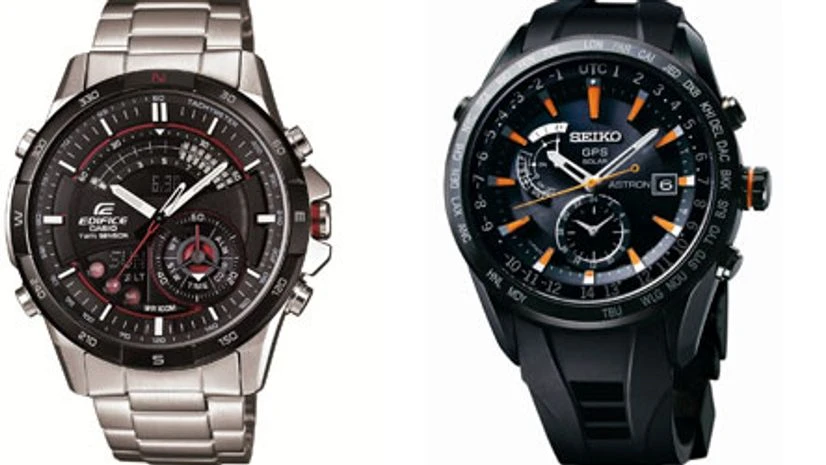The Seiko Astron is a unique watch — automatically adjusting to the time zone you are in. And not just one time zone. It recognises all 39 global time zones. The world’s first solar-powered analog watch has an in-built global positioning system (GPS) that receives location and time signals from a GPS satellite network — 24 satellites in orbit at 20,000 km, each one of them with an atomic clock. This feature makes the Astron accurate to one second every 100,000 years.
With one push of a button, the Astron takes six seconds to register and update the time, and 30 seconds to adjust the location. Setting the time and location is easier when you are sationary and standing under the sky.
Though a solar-powered watch, the Astron gets its power from any light absorbed through the dial. A power reserve indicator on the left shows the amount of energy remaining.
Watches in the Astron series have a case diameter of 47 mm and thickness of 16 mm. The dial glass is made of sapphire crystal with super-clear coating. Our review model (the SAST011) had a stainless steel case with black hard coating and ceramic bezel. The band in the SAST011 uses an extra-strength silicon and has a three-fold clasp push button release system.
The Astron has a perpetual calendar that is accurate till 2100. The multi-indicator displays satellite acquisition status, power reserve, flight mode and daylight saving mode. The silicon strap on the Astron is four times stronger than regular ones. The watch has a water resistance of upto 100 metres and magnetic resistance of 4,800 ampere/metre.
The Astron is ideal for frequent travellers zipping across time zones. Available in high-intensity titanium and stainless steel, the Astron series is priced between Rs 1.3 lakh (our review model) and Rs 2.55 lakh.
Details at you fingertips
The Casio Edifice Twin Sensor oozes toughness. Be it the mineral glass, the stainless steel bezel/case or the three-clasp metal band, the version we reviewed, the watch seems all set to survive the rough and tumble of life.
The watch has enough heft to let you know there’s something on your wrist, yet isn’t too heavy to be worn all day. The clasp on the strap is strong enough to prevent any accidents while you’re skydiving.
The Edifice is called a twin sensor because of its ability to measure the temperature and direction, with a digital compass on board. Besides a 1/100-second chronograph, the watch also sports a thermometer, a tachymeter and world time (with 31 time zones and daylight savings time), along with five alarms, which could have been louder. The watch is water resistant to a depth of 100 metres, so you can safely wear it while swimming.
It has an auto calendar till 2099, which perhaps will outlive the watch itself. The illuminator, though good for the hands of the watch, is inadequate to light up the white on black display in bright sunlight. But if one holds the watch at an angle, its easy to read the display even in daytime. The battery is rated to last for two years and the watch was quite accurate in the limited period we used it.
At around Rs 15,000, there’s a lot that this watch has to offer. Unlike its ultra premium companion, it won’t break your bank to own this piece of Japanese precision.
Seiko Astron
Rs 1.3 - 2.55 lakh
Rs 1.3 - 2.55 lakh
The Seiko Astron automatically adjusts to the timezone one travels to, using GPS satellites and atomic clocks
Casio Edifice Twin Sensor
Rs 15,000
The watch can measure temperature and distance (wih a digital compass), besides being equipped with tachymeter and world time
Casio Edifice Twin Sensor
Rs 15,000
The watch can measure temperature and distance (wih a digital compass), besides being equipped with tachymeter and world time

)
